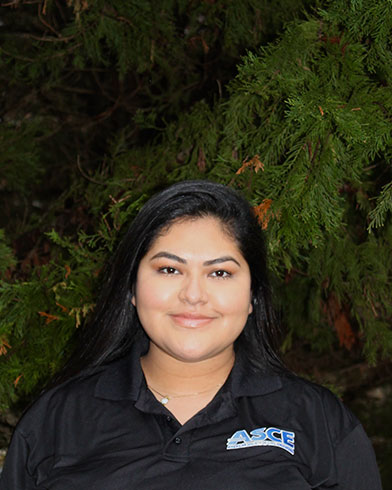Civil engineering major Karla Pineda’s undergraduate career is about to end. Yet, as she prepares to embark on her accelerated master’s program, she reflects on what inspired her to study civil engineering.
Born in El Salvador, Pineda and her family moved to Northern Virginia when she was 4 years old. She always had an interest in STEM and loved working on tangible projects, so she quickly realized civil engineering was her path.
But visits back to El Salvador led her to concentrate on transportation engineering. “When I traveled home, it was hard to see the harsh difference in infrastructure, especially transportation infrastructure, and that made me more interested in the transportation side of civil engineering,” she says.
Pineda is specifically interested in the intersection between transportation and sustainability. “In El Salvador, and many other places, you can clearly see how pollution has affected the lands and the communities. I know we can do better, we have one earth, and we have to make changes.”
She sees transportation as an accessible path to pursue sustainable efforts because almost everyone uses some form of transportation regularly. “There are little modifications we can make in transportation engineering that will have a huge impact,” says Pineda. Changes like recycling asphalt, using more sustainable materials, and adjusting one’s lifestyle can make a difference.
Mason’s student club, Engineers for International Development (EfID), fascinated Pineda because of their mission to tackle these grand challenges, one small change at a time. Currently, she serves as the vice president and works with the president and the executive board to coordinate events centered around sustainability.
“Typically, we take a trip down to Ecuador in the winter and summer to help a village build a sustainable water supply, but with COVID-19, we haven’t been able to do that,” she says. “We have gotten creative to help the village from a distance and creating other socially distanced events. We’ve hosted a few tree planting events throughout the community, and I worked with other members of the club to translate guides and information to send to the village in Ecuador.”
As part of her accelerated master’s program in transportation engineering, Pineda has already started taking graduate courses during her undergraduate education. She says she chose the accelerated master’s option because it made sense for her long-term career goals and allows her to learn more about transportation engineering. “Getting a master’s in one year instead of two is a great opportunity. I get to take graduate courses in my undergraduate career, and in five years, I come out with a solid foundation of knowledge in civil and transportation engineering,” she says.
“I love school, I love to learn, and the bachelor’s program gives a strong foundation in civil engineering, but I want to be prepared for a career in transportation engineering,” says Pineda.

